-
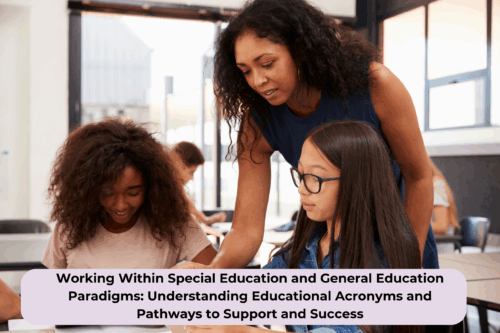 It is time to integrate the valuable insights and trauma-informed, community responsive approaches with the laws and mandates governing behavioral health. First, we will clarify the alphabet soup of educational acronyms as we examine the hierarchy of laws and rights that guide our work in implementing behavioral health in education while ensuring compliance with special education regulations. Next, we will discuss the importance of federal rights and how they are applied specifically in the state of Colorado, including a comparison of Individualized Education Programs (IEPs) and Section 504 plans to highlight educators' responsibilities in each case. We will also explore pathways to support and success by learning about the Child Find process, with a focus on the obligations of educators. Additionally, we will explore the intersection of Multi-Tiered Systems of Support (MTSS) and special education identification, as well as some criteria that determine a student’s eligibility for special education services. Join us to learn how to stay compliant without losing the heart of education!
It is time to integrate the valuable insights and trauma-informed, community responsive approaches with the laws and mandates governing behavioral health. First, we will clarify the alphabet soup of educational acronyms as we examine the hierarchy of laws and rights that guide our work in implementing behavioral health in education while ensuring compliance with special education regulations. Next, we will discuss the importance of federal rights and how they are applied specifically in the state of Colorado, including a comparison of Individualized Education Programs (IEPs) and Section 504 plans to highlight educators' responsibilities in each case. We will also explore pathways to support and success by learning about the Child Find process, with a focus on the obligations of educators. Additionally, we will explore the intersection of Multi-Tiered Systems of Support (MTSS) and special education identification, as well as some criteria that determine a student’s eligibility for special education services. Join us to learn how to stay compliant without losing the heart of education! -
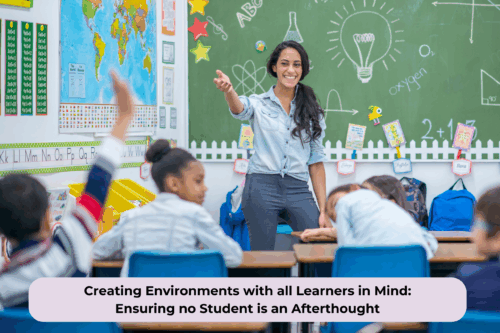 Time to move from skill-building to cultivating environments that promote individual and collective growth, so each student has the space to flourish. By utilizing trauma and community responsive approaches coupled with neurotype-responsive practices, we will explore how the design of classroom spaces, daily routines, and relationships can actively promote success for every learner. Participants will engage with frameworks that encourage intentional decision-making, reduce power struggles, and enhance emotional safety. Together, we will explore class wide frameworks that help students access "doses of regulation" throughout the day, anchoring their learning in self-awareness and self-advocacy. We will explore the question, “What does a regulatory environment look like?” to understand how such an environment feels, functions, and transforms interactions. Join this deep dive into really understanding what regulation is and isn't!
Time to move from skill-building to cultivating environments that promote individual and collective growth, so each student has the space to flourish. By utilizing trauma and community responsive approaches coupled with neurotype-responsive practices, we will explore how the design of classroom spaces, daily routines, and relationships can actively promote success for every learner. Participants will engage with frameworks that encourage intentional decision-making, reduce power struggles, and enhance emotional safety. Together, we will explore class wide frameworks that help students access "doses of regulation" throughout the day, anchoring their learning in self-awareness and self-advocacy. We will explore the question, “What does a regulatory environment look like?” to understand how such an environment feels, functions, and transforms interactions. Join this deep dive into really understanding what regulation is and isn't! -
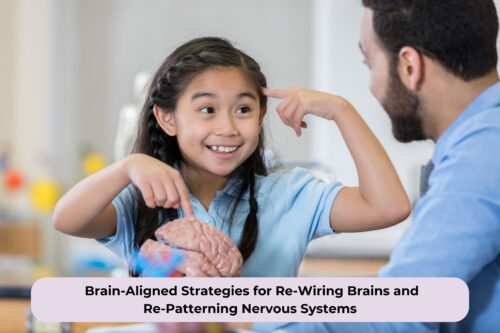 When strategies that have always worked in the past, are not working, it’s frustrating! In fact, sometimes our responses even seem to make the situation worse. What’s going on? When we learn to identify brain and body states it facilitates using the right strategy at the right time, including understanding why something might work in one moment and not another. When students aren’t in the higher regions of their brains, some strategies meant to support them, actually create escalation. Learn critical classroom strategies that work with students during varying states of arousal, expanding windows of tolerance and getting students back to places of learning. Strengthen your ability to help students grow their capacity for dealing with stress and challenges in and out of the classroom as you support creating new options for behavior.
When strategies that have always worked in the past, are not working, it’s frustrating! In fact, sometimes our responses even seem to make the situation worse. What’s going on? When we learn to identify brain and body states it facilitates using the right strategy at the right time, including understanding why something might work in one moment and not another. When students aren’t in the higher regions of their brains, some strategies meant to support them, actually create escalation. Learn critical classroom strategies that work with students during varying states of arousal, expanding windows of tolerance and getting students back to places of learning. Strengthen your ability to help students grow their capacity for dealing with stress and challenges in and out of the classroom as you support creating new options for behavior. -
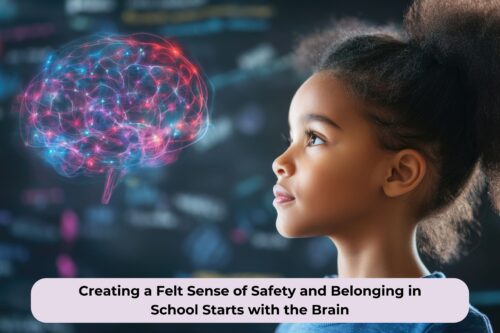 Safety and belonging start with the brain! Creating a safe and welcoming environment is the foundation of classroom culture and community and is crucial for academic success and overall well-being. We spend so much time creating beautiful classrooms, however, providing students with a sense of security can be challenging if we don't understand how the brain perceives safety and threats. You cannot talk someone into feeling safe. Learn to use approaches that foster a sense of safety, nurture trust and belonging, and support students in approaching challenges with curiosity instead of fear as they learn that they can manage to do things that are difficult.
Safety and belonging start with the brain! Creating a safe and welcoming environment is the foundation of classroom culture and community and is crucial for academic success and overall well-being. We spend so much time creating beautiful classrooms, however, providing students with a sense of security can be challenging if we don't understand how the brain perceives safety and threats. You cannot talk someone into feeling safe. Learn to use approaches that foster a sense of safety, nurture trust and belonging, and support students in approaching challenges with curiosity instead of fear as they learn that they can manage to do things that are difficult. -
 Join us for this exciting program in which we will be exploring ways to support students and educators. You’ll learn strategies for use in educational settings that promote trauma-informed, social-emotional support. You’ll learn the neuroscience behind these strategies, as you focus on teaming and working together to support your community. Click here for instructions on how to register.
Join us for this exciting program in which we will be exploring ways to support students and educators. You’ll learn strategies for use in educational settings that promote trauma-informed, social-emotional support. You’ll learn the neuroscience behind these strategies, as you focus on teaming and working together to support your community. Click here for instructions on how to register. -
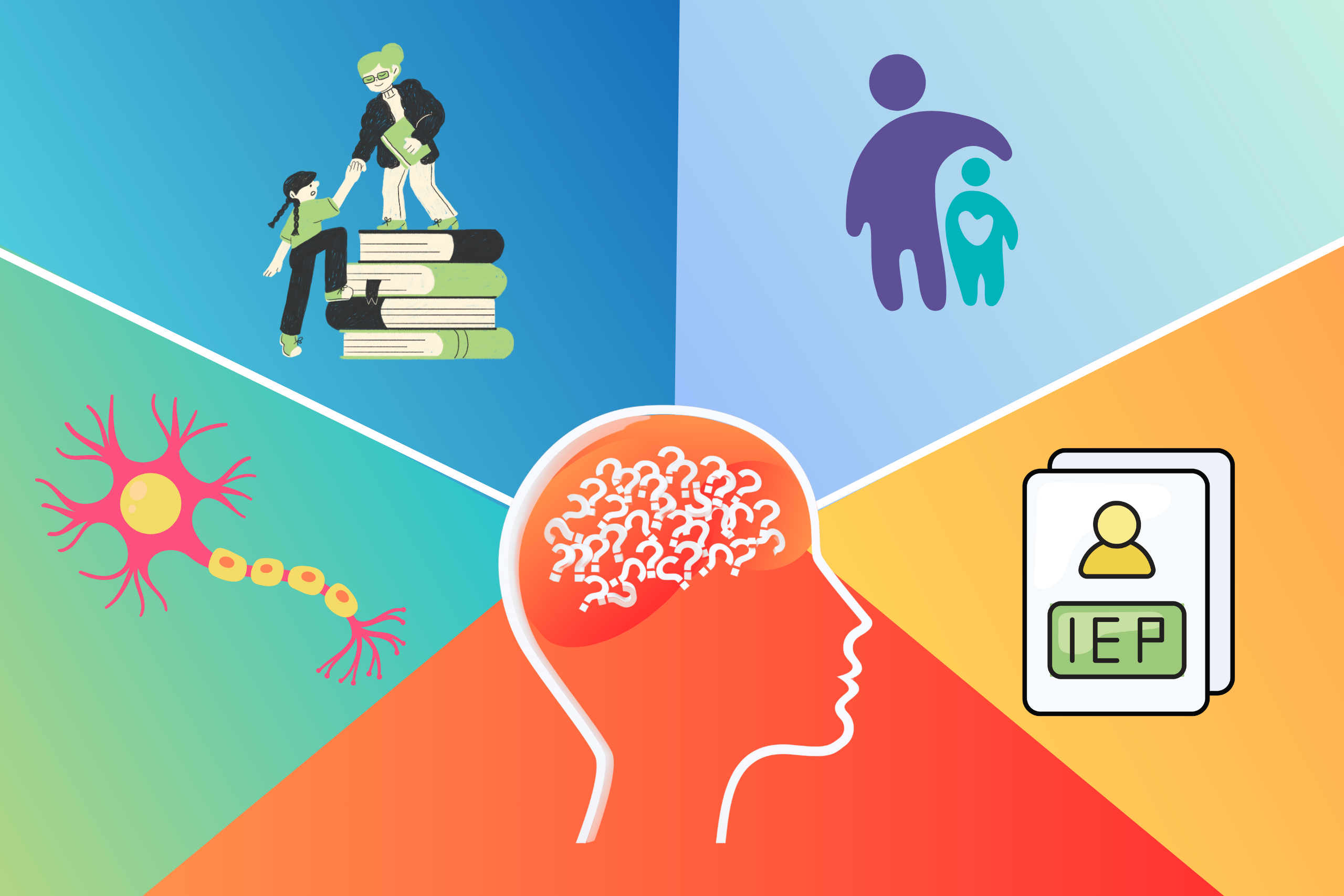 Designed for Colorado educators and beyond. Join this self-paced 10-part video training program (15 contact hours) that meets the behavioral health relicensure requirement for all Colorado educators and equips educators nationwide to champion student well-being and confidently navigate federal mandates. Unlock the science, soul, and systemic wisdom behind today’s most vital educational shift. This dynamic series empowers educators, school leaders, and support professionals to build trauma-informed, neurotype-responsive environments where every learner can thrive. From the first foundational step, defining behavioral health within the educational landscape, to exploring the neurobiology of regulation, the architecture of safety and belonging, and the frameworks that bring empowerment-focused practices to life, this program delivers actionable insight with heart and precision. Practical and visionary, this program bridges evidence-based neuroscience with policy, relational teaching, and legal clarity, without losing the emotional heartbeat of education. Whether you're teaching in the classroom, designing learning spaces, supporting complex behaviors, or decoding acronyms like FAPE, MTSS, and IDEA, these modules meet you where you are and move you toward systemic coherence. Key Features that Make this Training Unique 🔑 Meets Colorado Department of Education’s Behavioral Health Relicensure Requirements 🔑Self-paced and accessible from anywhere, anytime, you have plenty of time to complete it 🔑Research-backed with real-world classroom strategies 🔑Integrates neuroscience, trauma-informed practice, and legal clarity 🔑Designed by educators, for educators This program gives you the tools to move from reaction to intention—and from burnout to real impact. What You'll Gain ✅ Practical brain-aligned strategies you can use tomorrow ✅ Scalable approaches to create regulated and resilient schools where all students and adults belong. ✅ Confidence navigating federal policy with compassion and clarity Who Should Attend? This program was designed for all teachers, school-based mental health professionals (counselors, social workers, and psychologists), educational leaders, and all student support staff such as paraprofessionals, behavioral specialists or social-emotional behavior support coaches. 💡 Join us, not to meet a standard, but to create a new one!
Designed for Colorado educators and beyond. Join this self-paced 10-part video training program (15 contact hours) that meets the behavioral health relicensure requirement for all Colorado educators and equips educators nationwide to champion student well-being and confidently navigate federal mandates. Unlock the science, soul, and systemic wisdom behind today’s most vital educational shift. This dynamic series empowers educators, school leaders, and support professionals to build trauma-informed, neurotype-responsive environments where every learner can thrive. From the first foundational step, defining behavioral health within the educational landscape, to exploring the neurobiology of regulation, the architecture of safety and belonging, and the frameworks that bring empowerment-focused practices to life, this program delivers actionable insight with heart and precision. Practical and visionary, this program bridges evidence-based neuroscience with policy, relational teaching, and legal clarity, without losing the emotional heartbeat of education. Whether you're teaching in the classroom, designing learning spaces, supporting complex behaviors, or decoding acronyms like FAPE, MTSS, and IDEA, these modules meet you where you are and move you toward systemic coherence. Key Features that Make this Training Unique 🔑 Meets Colorado Department of Education’s Behavioral Health Relicensure Requirements 🔑Self-paced and accessible from anywhere, anytime, you have plenty of time to complete it 🔑Research-backed with real-world classroom strategies 🔑Integrates neuroscience, trauma-informed practice, and legal clarity 🔑Designed by educators, for educators This program gives you the tools to move from reaction to intention—and from burnout to real impact. What You'll Gain ✅ Practical brain-aligned strategies you can use tomorrow ✅ Scalable approaches to create regulated and resilient schools where all students and adults belong. ✅ Confidence navigating federal policy with compassion and clarity Who Should Attend? This program was designed for all teachers, school-based mental health professionals (counselors, social workers, and psychologists), educational leaders, and all student support staff such as paraprofessionals, behavioral specialists or social-emotional behavior support coaches. 💡 Join us, not to meet a standard, but to create a new one! -
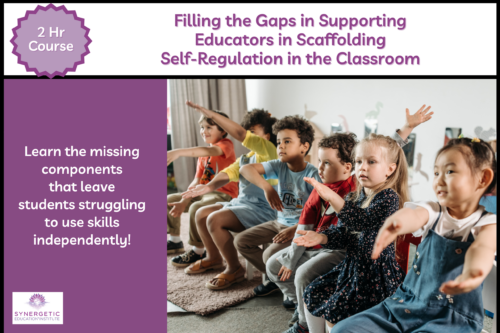
Join us for this 2-hour course as we identify and fill the gaps in supporting students and educators!
Educators are working harder than ever to teach social-emotional skills, yet many still feel frustrated when students struggle to apply what they've learned—especially when it comes to behavior and self-regulation. The reality? Most SEL programs are missing key components. Without the right scaffolding, students may understand self-regulation strategies in theory, but when big emotions hit, they can’t access or use them effectively. This can lead to a cycle of frustration for both educators and students. In this live, interactive training, we’ll uncover what’s missing and how mental health professionals can support educators in making simple but powerful shifts that integrate intentionally developing self-regulation skills daily in the classroom.
What You’ll Learn:
✔️ The hidden gaps in many SEL programs that prevent students from self-regulating.
✔️ How to scaffold self-regulation skills so students can apply strategies independently—even in moments of stress.
✔️ Small, practical shifts educators can make in their daily routines that lead to lasting behavior change.
Who Should Attend? This training is designed for school-based and clinical mental health professionals who support educators and students. Whether you work directly in schools or in private practice, you’ll leave with insights and tools you can use immediately to help educators bridge the gap between teaching self-regulation and students actually using it when they need it most.
💡 Join us and learn how to make self-regulation easier—not harder—for both students and educators.
-
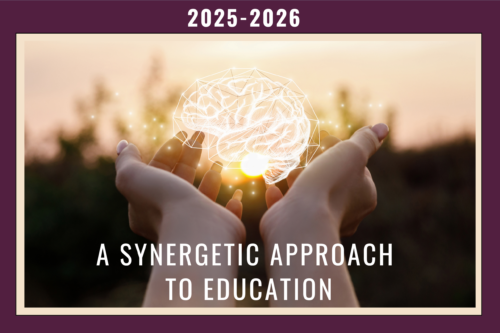
Use Early Bird Coupon Code “EarlyBird50” for $50 USD off until October 1st!
Registration Deadline is October 28th, 2025, 12pm MST
Are you a school-based mental health professional questioning how to truly support students struggling with challenging behaviors? Or maybe, you’re finding yourself stuck between educational demands and the real needs of your students? Or perhaps you’re trained in Synergetic Play Therapy and looking for ways to bring your SPT skills into schools or educational settings to make a deeper impact? A Synergetic Approach to Education is here to bridge that gap, offering you practical, neuroscience-backed strategies that are not just “another thing on your or others’ plates,” but tools to transform your approach to classroom regulation and student engagement. How Is This Different from Other Programs? Unlike traditional educational programs that often overlook the link between mental health and classroom dynamics, our approach integrates decades of experience working at the intersection of education and mental health. This isn’t just about adding new techniques—it’s about fundamentally reshaping how you understand and respond to student behaviors. You’ll learn to implement small but powerful shifts in daily routines that prepare brains and bodies to learn, helping educators see beyond surface-level behaviors to the neurophysiological states driving them. What Does This Have to Do with SPT? Rooted in Synergetic Play Therapy principles, this program extends the insights of SPT into the classroom, giving you what you need to empower educators to become external regulators who support students in real time. You’ll discover how to translate the SPT model’s emphasis on regulation, curiosity, and connection into practical strategies that fit naturally into classroom settings. Our unique lens helps educators see their own roles in student dynamics, fostering environments of safety, belonging, and co-regulation that elevate everyone. What Will You Learn That Makes Us Different?- Identify Missing Pieces in School Programs: Discover critical components often absent from current school approaches that keep students stuck in challenging behaviors and learn how to explicitly teach educators how to prepare brains and bodies to learn with “top-down” and “bottom-up” approaches.
- Model Classroom-Wide Regulation: Learn how to demonstrate regulation strategies that benefit all students and teachers, without adding extra workload.
- Understand Underlying Issues: Help educators recognize the deeper dynamics affecting classroom behaviors in ways that make sense to them, making their interventions more effective and sustainable.
- Tailor Supports to Educators' Realities: Establish practical approaches that account for differing student needs while ensuring educators can implement them seamlessly in their classrooms.
- Address Barriers with Curiosity: Tackle common challenges educators face and empower them to engage with these difficulties using a mindset of curiosity rather than resistance.
- Prepare Brains and Bodies to Learn: Gain tools to articulate the connection between neurophysiological states and behaviors, equipping educators to support students more effectively.
- Practical, Scalable Strategies: Implement classroom-wide regulation that supports every student and doesn’t feel like “one more thing.”
- Deeper Understanding of Behavior Dynamics: Uncover the root causes of challenging student behaviors and learn how to guide educators in addressing them.
- Empowerment to Transform Classrooms: Use the principles of SPT to create regulatory environments that allow for dynamic, individualized support.
- Collaboration and Connection: Model how to balance support and challenge, cultivating resilience in educators and students alike.
Program Prerequisites: This program requires that you have taken a Level 1 Introduction to Synergetic Play Therapy® program. This includes the completion of one of the following:- Online or In-Person Introduction to Synergetic Play Therapy® program
- Six-Day Synergetic Play Therapy® Intensive Training (no longer offered)
- Synergetic Play Therapy® Supplemental Course (no longer offered)
-
 Use Early Bird Coupon Code “EarlyBird50” for $50 USD off until October 1st!
Use Early Bird Coupon Code “EarlyBird50” for $50 USD off until October 1st!Registration Deadline is October 28, 2025, 12pm MST
Are you a school-based mental health professional questioning how to truly support students struggling with challenging behaviors? Or maybe, you’re finding yourself stuck between educational demands and the real needs of your students? Or perhaps you’re trained in Synergetic Play Therapy and looking for ways to bring your SPT skills into schools or educational settings to make a deeper impact? A Synergetic Approach to Education is here to bridge that gap, offering you practical, neuroscience-backed strategies that are not just “another thing on your or others’ plates,” but tools to transform your approach to classroom regulation and student engagement. How Is This Different from Other Programs? Unlike traditional educational programs that often overlook the link between mental health and classroom dynamics, our approach integrates decades of experience working at the intersection of education and mental health. This isn’t just about adding new techniques—it’s about fundamentally reshaping how you understand and respond to student behaviors. You’ll learn to implement small but powerful shifts in daily routines that prepare brains and bodies to learn, helping educators see beyond surface-level behaviors to the neurophysiological states driving them. What Does This Have to Do with SPT? Rooted in Synergetic Play Therapy principles, this program extends the insights of SPT into the classroom, giving you what you need to empower educators to become external regulators who support students in real time. You’ll discover how to translate the SPT model’s emphasis on regulation, curiosity, and connection into practical strategies that fit naturally into classroom settings. Our unique lens helps educators see their own roles in student dynamics, fostering environments of safety, belonging, and co-regulation that elevate everyone. What Will You Learn That Makes Us Different?- Identify Missing Pieces in School Programs: Discover critical components often absent from current school approaches that keep students stuck in challenging behaviors and learn how to explicitly teach educators how to prepare brains and bodies to learn with “top-down” and “bottom-up” approaches.
- Model Classroom-Wide Regulation: Learn how to demonstrate regulation strategies that benefit all students and teachers, without adding extra workload.
- Understand Underlying Issues: Help educators recognize the deeper dynamics affecting classroom behaviors in ways that make sense to them, making their interventions more effective and sustainable.
- Tailor Supports to Educators' Realities: Establish practical approaches that account for differing student needs while ensuring educators can implement them seamlessly in their classrooms.
- Address Barriers with Curiosity: Tackle common challenges educators face and empower them to engage with these difficulties using a mindset of curiosity rather than resistance.
- Prepare Brains and Bodies to Learn: Gain tools to articulate the connection between neurophysiological states and behaviors, equipping educators to support students more effectively.
- Practical, Scalable Strategies: Implement classroom-wide regulation that supports every student and doesn’t feel like “one more thing.”
- Deeper Understanding of Behavior Dynamics: Uncover the root causes of challenging student behaviors and learn how to guide educators in addressing them.
- Empowerment to Transform Classrooms: Use the principles of SPT to create regulatory environments that allow for dynamic, individualized support.
- Collaboration and Connection: Model how to balance support and challenge, cultivating resilience in educators and students alike.
Program Prerequisites: This program requires that you have taken a Level 1 Introduction to Synergetic Play Therapy® program. This includes the completion of one of the following:- Online or In-Person Introduction to Synergetic Play Therapy® program
- Six-Day Synergetic Play Therapy® Intensive Training (no longer offered)
- Synergetic Play Therapy® Supplemental Course (no longer offered)
-
 This 21-hour program dives deeply into understanding the context in which learning and growth take place. Neuroscience can help us understand what is happening in moments of dysregulation, so we can learn how to support regulation for children and classrooms and create regulatory environments. You’ll learn to use brain and body state awareness to guide you in applying strategies and learn how to talk to others about the science behind the strategies you’re using. Utilizing a developmental approach, we’ll focus on supporting both educators and children, as we explore what it means to become an external regulator. Navigating the complexities of our interactions will allow us to shift even the most challenging dynamics. Welcome, we are excited to share this journey with you.
This 21-hour program dives deeply into understanding the context in which learning and growth take place. Neuroscience can help us understand what is happening in moments of dysregulation, so we can learn how to support regulation for children and classrooms and create regulatory environments. You’ll learn to use brain and body state awareness to guide you in applying strategies and learn how to talk to others about the science behind the strategies you’re using. Utilizing a developmental approach, we’ll focus on supporting both educators and children, as we explore what it means to become an external regulator. Navigating the complexities of our interactions will allow us to shift even the most challenging dynamics. Welcome, we are excited to share this journey with you. -
 Keep the momentum going and continue growing and learning! Nurture the bonds you've built, with our 6-month group consultation journey designed for those who’ve completed one of our signature SEI programs. It’s a chance to deepen your learning, stay inspired, and grow together with our vibrant global community. Join Judy for six 1-hour group consultation sessions. This is your space to pause, reflect, and recharge. A place to reconnect with the heart of our work and the people who make it meaningful. Whether you're navigating challenges or celebrating wins, we want to walk alongside you. Use the dropdown menu to choose the group that fits your schedule the best. For dates and times, refer to the details below.
Keep the momentum going and continue growing and learning! Nurture the bonds you've built, with our 6-month group consultation journey designed for those who’ve completed one of our signature SEI programs. It’s a chance to deepen your learning, stay inspired, and grow together with our vibrant global community. Join Judy for six 1-hour group consultation sessions. This is your space to pause, reflect, and recharge. A place to reconnect with the heart of our work and the people who make it meaningful. Whether you're navigating challenges or celebrating wins, we want to walk alongside you. Use the dropdown menu to choose the group that fits your schedule the best. For dates and times, refer to the details below. -
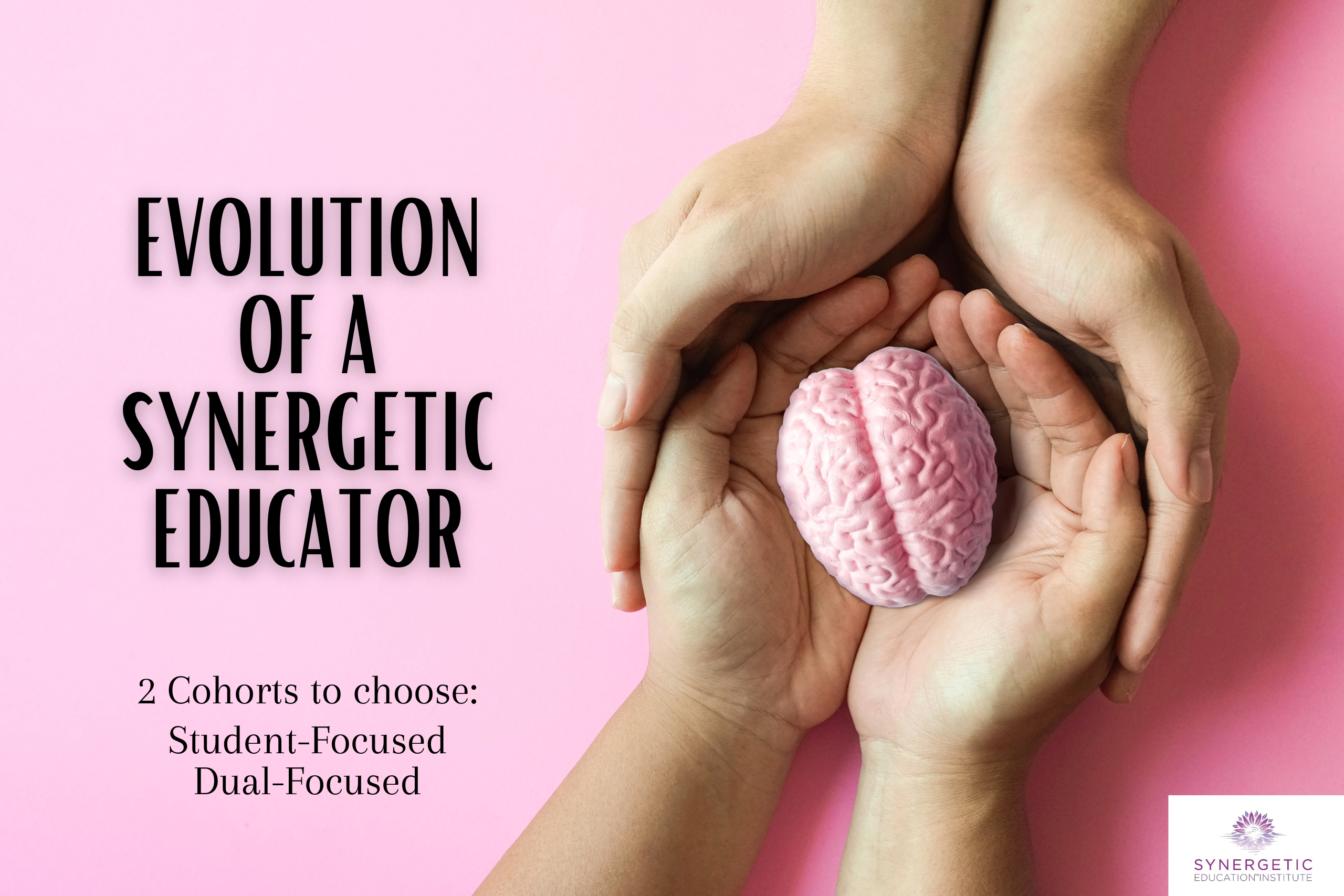
Discover the missing pieces in working with daily challenges in teaching and learning with our unique approach,
while earning up to 26 contact hours for relicensure!
Early bird registration is now open! Use code “2026EarlyBird” to save $40 USD when you register by December 15th.
Registration Deadline is February 1, 2026, 12pm Mountain Time (Denver)
Are you finding that some students remain stuck in challenging behaviors despite your best efforts? Or perhaps you’re dedicated to fostering a classroom where every student can thrive but finding that traditional methods aren’t delivering the results you hoped for …. Then join us for the Evolution of a Synergetic Educator program - it’s more than just a set of new tools! It’s about empowering you with a deep understanding of what’s occurring with your students and in your classrooms. Insight into the root causes and underlying dynamics inform our easy-to-use practical strategies for addressing today’s challenges. We'll empower you to step into being the educator you set out to be before the realities of teaching got in the way. By filling in the missing pieces that traditional approaches often overlook, you’ll be prepared to create lasting positive change in your classroom and your students’ lives, in ways that feel authentic and congruent for you. We'll guide you through the process, with science, practice, and application support; YOU choose what fits you and your students! Here’s What Sets Us Apart:- Addressing Root Causes, Not Just Symptoms: Traditional approaches to student behavior often miss the mark, sometimes even escalating situations. Our program teaches you how to recognize brain and body states that influence student behavior, allowing you to intervene with the right strategy at the right time.
- Creating Felt Safety and Belonging: Safety and belonging aren’t just about a welcoming environment—they start in the brain. Our program teaches you how to foster an atmosphere where you can help your students develop a felt sense of safety and belonging, leading to better self-regulation and a readiness to learn.
- Empower Students Through Regulation: Regulation is most effective when it’s integrated throughout the day, not just during scheduled brain breaks. We teach you how to guide students in understanding their own activation and behavior, helping them take responsibility for their behavior and regulation.
- Shifting Resistance into Readiness: Collaborating with colleagues can be challenging, especially when resistance to change is high. Our revolutionary Developmental Mindsets Paradigm™ offers strategies to shift resistance into readiness, creating a ripple effect that transforms school culture into one that prioritizes regulation, safety, and belonging for all.
- Bridging Gaps in Social-Emotional Learning (SEL): Traditional SEL programs often overlook critical elements like interoceptive awareness and the ability to adapt strategies to different environments. We teach you how to integrate these missing pieces, helping students use SEL skills independently and effectively.
- Transforming Student-Adult Relationships: Power struggles and miscommunication can derail student-adult interactions. Our program equips you with tools to navigate these complex dynamics, fostering trust, respect, and mutual understanding that lead to positive changes in your classroom and students’ lives.

